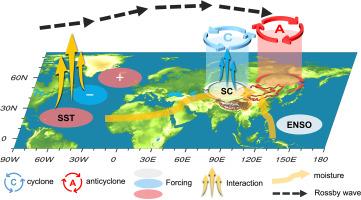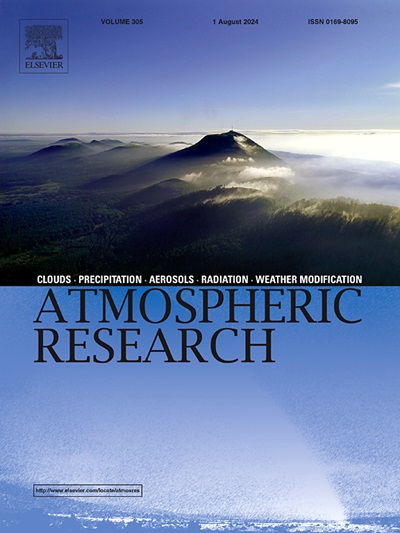Combined effects of ocean-land processes on spring precipitation variability in Mongolian Plateau
IF 4.5
2区 地球科学
Q1 METEOROLOGY & ATMOSPHERIC SCIENCES
引用次数: 0
Abstract
The Mongolian Plateau hosts one of the world's most fragile ecosystems, characterized by high volatility and frequent natural disasters due to rapid climate change and human activities in recent decades. Frequent dust storms notably mark spring in this region. Through observational analysis and numerical modeling, this study investigates the impacts of comprehensive ocean and land processes—including sea surface temperature (SST) in the North Atlantic and Pacific Oceans, as well as Eurasian land conditions—on the interannual fluctuations of spring precipitation in the Mongolian Plateau (SPMP) from 1979 to 2020. The ocean-land processes involve: a tripole pattern of North Atlantic SST anomalies triggers an eastward-propagating continental-scale wave train; Increased snow cover in Central Asia induces significant anomalous low pressure through the albedo effect; El Niño-Southern Oscillation initiate a teleconnection pattern over the upstream region of the Indian-western Pacific Ocean. These anomalous ocean and land conditions interact with large-scale atmospheric circulations, altering dynamical and hydrological conditions around the Mongolian Plateau, thereby contributing to SPMP variation. Further corroboration from numerical model experiments supports the observational analysis results. The combined effects of multiple ocean-land factors effectively explain precipitation variability across extensive areas of the Mongolian Plateau. A regression model constructed using these land-ocean factors captures the time evolution of the SPMP well.

海洋-陆地过程对蒙古高原春季降水变化的综合影响
蒙古高原拥有世界上最脆弱的生态系统之一,由于近几十年来气候变化迅速和人类活动的影响,这里的生态系统极不稳定,自然灾害频发。频繁的沙尘暴是该地区春季的显著特征。本研究通过观测分析和数值模拟,研究了海洋和陆地综合过程--包括北大西洋和太平洋的海面温度(SST)以及欧亚大陆陆地条件--对蒙古高原(SPMP)1979-2020 年春季降水量年际波动的影响。海洋-陆地过程包括:北大西洋 SST 异常的三极模式触发了向东传播的大陆尺度波列;中亚积雪的增加通过反照率效应诱发了显著的异常低气压;厄尔尼诺-南方涛动启动了印度洋-西太平洋上游地区的远程连接模式。这些异常的海洋和陆地条件与大尺度大气环流相互作用,改变了蒙古高原周围的动力和水文条件,从而导致了 SPMP 的变化。数值模式实验进一步证实了观测分析结果。多种海洋-陆地因素的综合影响有效解释了蒙古高原广大地区的降水变化。利用这些陆地-海洋因子构建的回归模型可以很好地捕捉 SPMP 的时间演变。
本文章由计算机程序翻译,如有差异,请以英文原文为准。
求助全文
约1分钟内获得全文
求助全文
来源期刊

Atmospheric Research
地学-气象与大气科学
CiteScore
9.40
自引率
10.90%
发文量
460
审稿时长
47 days
期刊介绍:
The journal publishes scientific papers (research papers, review articles, letters and notes) dealing with the part of the atmosphere where meteorological events occur. Attention is given to all processes extending from the earth surface to the tropopause, but special emphasis continues to be devoted to the physics of clouds, mesoscale meteorology and air pollution, i.e. atmospheric aerosols; microphysical processes; cloud dynamics and thermodynamics; numerical simulation, climatology, climate change and weather modification.
 求助内容:
求助内容: 应助结果提醒方式:
应助结果提醒方式:


